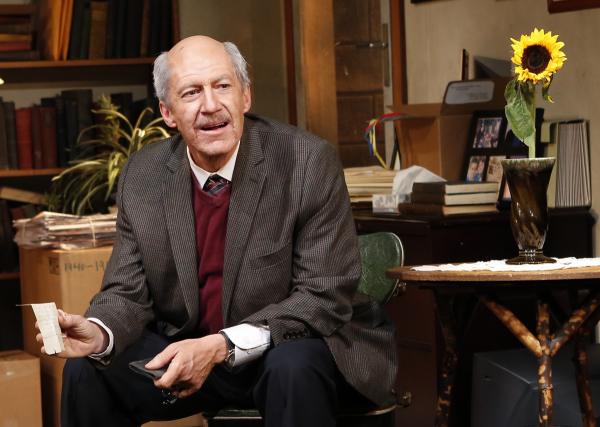Wiesenthal

(© Carol Rosegg)
Today, famed Nazi hunter Simon Wiesenthal retires from his noble line of work, and we are the final group of visitors he will entertain at his Austrian headquarters. Such is the pretense of Tom Dugan's self-penned solo show Wiesenthal, in which he heartily embodies this intriguing historical figure. The premise may be a bit contrived, but when a 90-minute discourse from the man himself is what you're after, there are few alternative routes to this road. Fortunately, the journey itself ends up both thoroughly edifying and surprisingly uplifting.
"Uplifting" might not be the first-choice adjective Wiesenthal would attribute to his 60-year career as a private agent devoted to bringing Nazi war criminals to justice. As a survivor of several Jewish concentration camps, he briefs us on his torturous journey through World War II, describing many of the indignities he suffered along the way. Yet he asserts early on: "It is not my goal today to produce tears. If that is what you want, you should go home and watch soap operas."
And Dugan's play, under the directorial hand of Jenny Sullivan, largely abides by this vow. Wiesenthal pragmatically traces his footsteps from camp to camp on the map of "Hitler's Europe" that stands behind his sloppy desk (one of the many detailed elements of Beowulf Boritt's thoughtful design) and matter-of-factly describes the finely honed process he developed for hunting down the men who perpetrated these acts of injustice.
Dugan, portraying Wiesenthal in 2003 at the ripe age of 94 (two years before his death), also adds some sugar to the bitter subject matter with flecks of charming charisma. He subdues his nagging wife in a series of phone conversations, hospitably offers to share a snack with a few lucky front-rowers, and delivers a handful of corny jokes that perfectly suit his endearingly elderly persona.
The piece does periodically slip into a more dramatic format, with Joel E. Silver's theatrical lighting cues prompting Dugan to reenact an event from the body of another character. In these moments we find something more akin to the traditional "play" format, with emotional monologues that unavoidably act upon the audience's tear ducts. Though Wiesenthal may be breaking his initial promise, these are the only scenes that distinguish Wiesenthal the character from a guest speaker at a college lecture hall. In either setting, Dugan showcases his deeply cultivated empathy with the character he has shaped both on paper and onstage in an impressive marathon performance. While he adds levity to his manner of storytelling, the unshakeable earnestness of his ultimate mission is always lingering just beneath the surface of his warmhearted grin.










